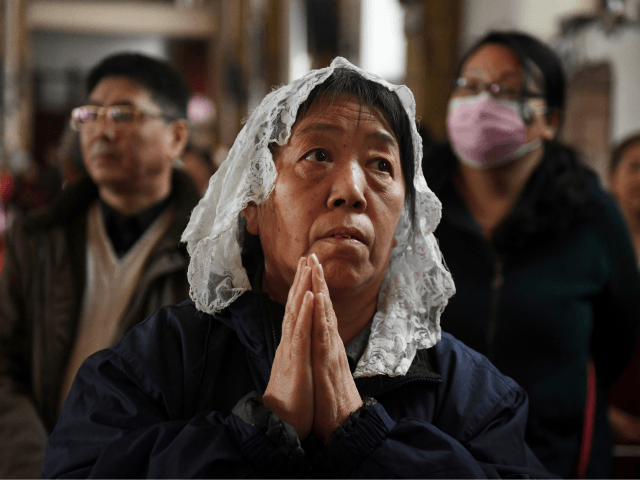Despite ongoing arrests and torture of Chinese Christians after a raid on an independent church Sunday, the faithful are vowing not to bow to the Communist party “even if it means death.”
“I think a lesson we can learn from them is they continue to say that, ‘No matter what may come, we will continue to serve the Lord. We will continue to stand strong in our faith,’” said Gina Goh, Southeast Asia regional manager for International Christian Concern.
“Their pastor, a lot of elders, actually wrote letters to their congregation saying that, ‘We will not bend, even if it means jail, even if it means death. We will continue to preserve our faith,’” Goh told Baptist Press Tuesday.
As Breitbart News reported Monday, Chinese security forces carried out a series of coordinated raids on the Early Rain Covenant Church, one of the most influential house churches in China, in the city of Chengdu Sunday evening, arresting as many as a hundred members including Pastor Wang Yi and his wife.
Authorities reportedly blocked the social media accounts of Early Rain members and cut the phone line to the church as the raid got underway. One witness claimed that Chinese police had tracked down church members using the signals from their smartphones.
According to Goh, officials had beaten, tortured, and denied food and restroom accommodations to the Christian detainees. Some of the Christians were dragged along the ground, stepped on, bound to chairs, and had handfuls of hair pulled from their scalp, she reported.
Some of those arrested have been placed under house arrest while others have been set free. Officials told a number of the faithful to sign pledges that they would never attend services again.
“The police said our church is an illegal organization and we cannot attend any more gatherings from now on,” said member Zhang Guoqing after being released from detention.
Since the Sunday raids, arrests of church members at homes, workplaces, and on the streets have continued.
The latest crackdown on “illegal” churches that operate outside strict government control is another example of President Xi Jinping’s attempts to “Sinicize” religion, making all religious practice conform to the ideals and principles of Chinese communism.
In September, authorities interrupted services at some five churches in in central, south, and southwest China, pulling down crosses, blocking entrances, disbanding worship, and harassing church members.
One elder of the Early Rain Covenant Church who was arrested early Tuesday wrote a letter before his arrest to other church members who were still at large.
“Beloved brothers and sisters, I am writing this letter in hiding,” he said. “May you all be filled with joy in the Gospel of Christ. May you welcome, filled with hope, the even heavier cross and more difficult lives that lie ahead of you. Christ is Lord. Grace is King. Bear the cross. Keep the faith.”
Goh said that the Chinese government is engaging in more overt persecution of Christians on a broader scale than in the past.
“This is not completely new, but for something that is this largescale, it is new for sure,” Goh said. The goal of the Communist party is to force Christian churches into allegiance to the state-controlled Three-Self Church, whose congregations must display government flags, sing patriotic songs, and praise government leaders, Goh said.
Goh also said that officials had targeted the popular Autumn Rain Church to “serve as an example to smaller churches,” since in its several locations it comprises a membership of a thousand members or more.
Last September, the Vatican announced the signing of a “provisional agreement” with China on the naming of bishops, without specifying the exact terms of the accord.
The deal was touted as a first step toward restoring diplomatic relations between the two parties, but critics have complained that ceding authority on the naming of bishops simply emboldened the Chinese Communist Party to harsher persecution of those who will not bow to the secular power.
Pope Francis attempted to assuage the doubts of Chinese Catholics and others concerned with the deal by writing a letter on September 26 to Catholics and China and “the universal Church,” urging them to trust him.
In testimony at a U.S. Congressional hearing in Washington in late September, China Aid founder Bob Fu compared Chinese Communist Party (CCP) persecution under President Xi Jinping to the days of Mao Zedong.
“The CCP’s policies and principles for the management of religious affairs are returning to those evident in Mao’s era,” Fu said.
Follow Thomas D. Williams on Twitter Follow @tdwilliamsrome

COMMENTS
Please let us know if you're having issues with commenting.